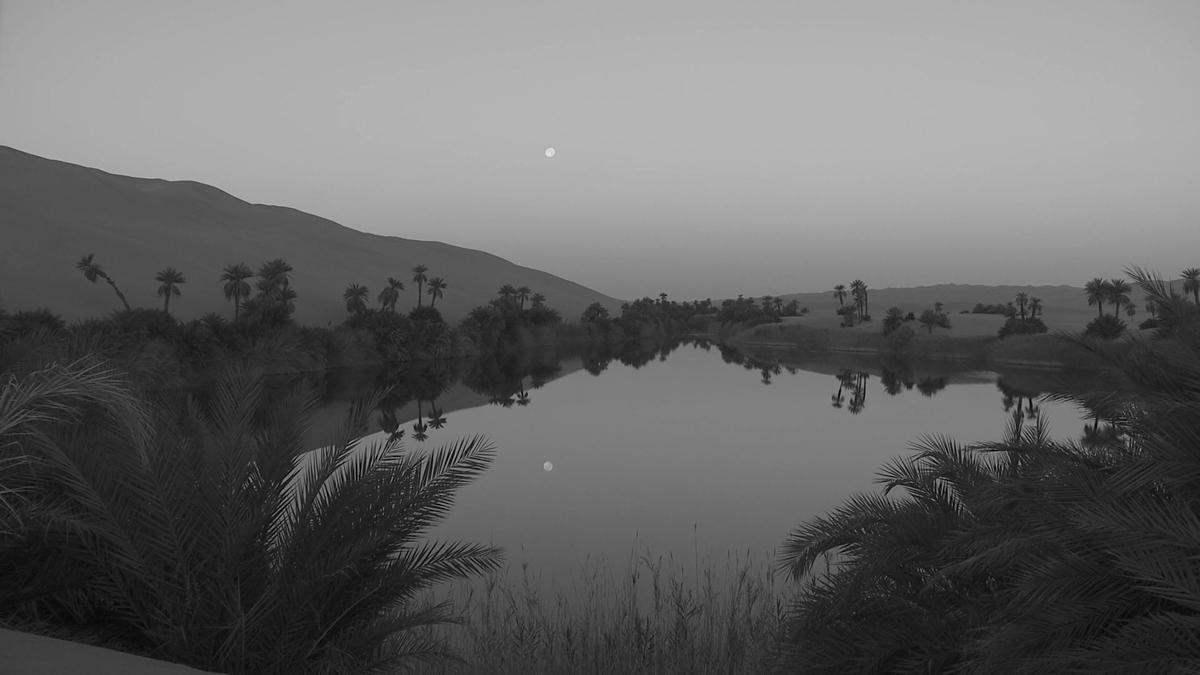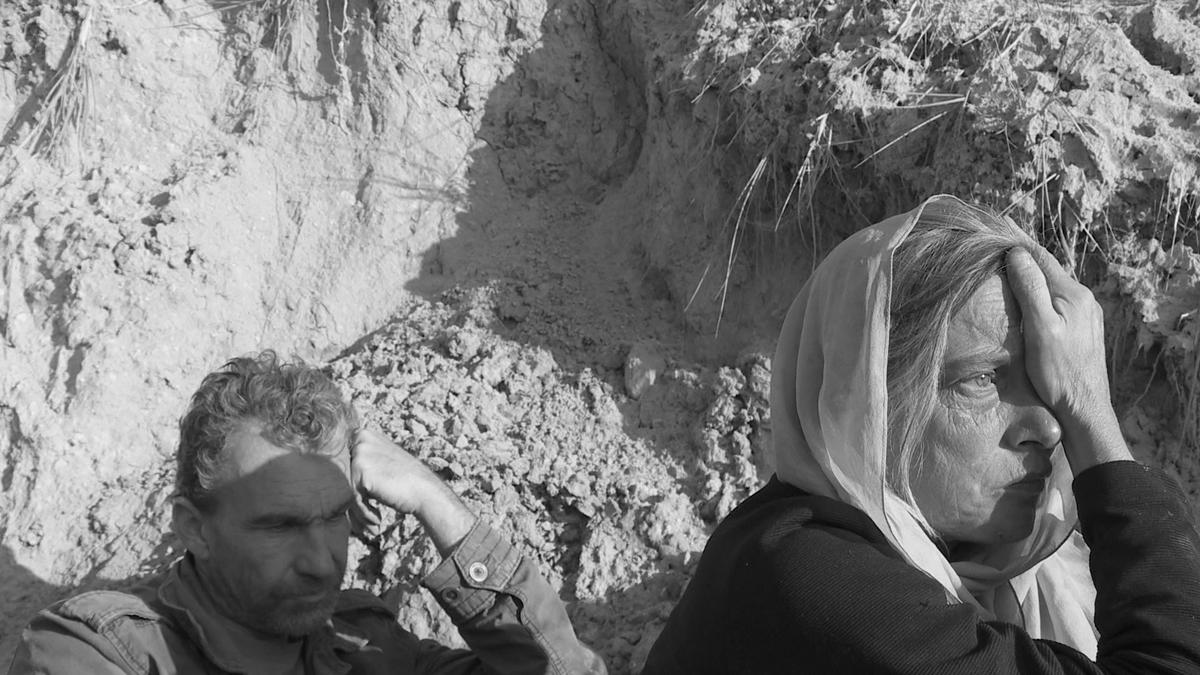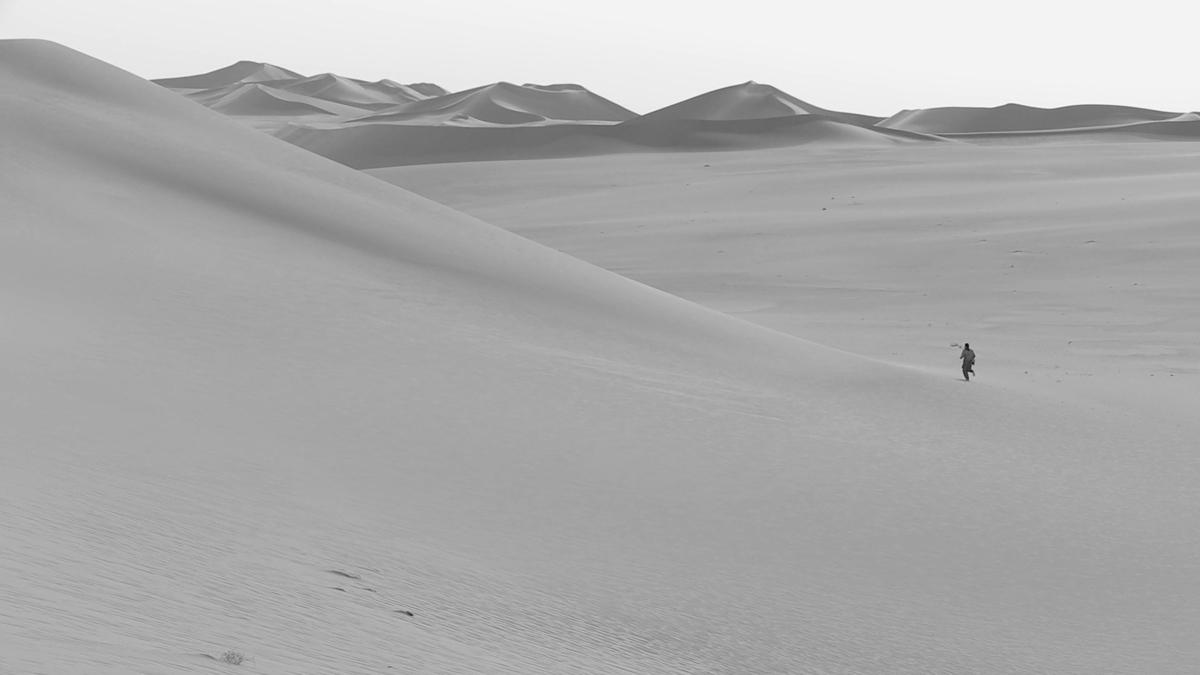FATA MORGANA
Should one attempt to judge what Peter Schreiner’s Fata Morgana intends to do in a single sentence, then the title of the first division of Martin Heidegger’s Time and Being would be rather fitting: “The Interpretation of Da-sein in terms of Temporality and the Explication of time as the Transcendental Horizon of the Question of Being.” The film’s three protagonists are occupied 140-minutes long with no less than the question of the meaning of existence. In other words, they are busy with a question for which the enlightened, secular Modern era has no understanding.
However, not in the sense of an ontological existential analysis, but rather, an experiment whose parameters Schreiner reveals right away in the first take. It shows the protagonists as three figures in a landscape. Awad Elkish rises to speak: “People had to find a point of reference or a foothold, and that, already, is a creative process.” The sentence is not directed at the other actors, or at himself; it passes by the camera, to an undefined nowhere, addresses a place where the director could be located, the crew, or simply the continuation of the visible landscape—the desert, whose function in the experiment is clarified by Awad’s next statement: “The space is cleared out.”
In fact, the cleared-out, deserted, empty spaces of the geological and industrial deserts in Fata Morgana could be interpreted as symbols of the search for meaning. In the sense of Heidegger, they would at least identify a spatial turning away from that improper “Dasein’s flight before itself,” which arises in taking care of everyday business. The interpretation is contradicted by the fact that the camera and microphone persistently emphasize the concrete, material presence of the empty spaces: Perhaps time is the transcendental horizon for the question of being, but in Peter Schreiner’s film, it can only be posed in the here and now of the lived moment. (Vrääth Öhner)
What will be left of this desert?
I detest my fears. Where shall I seek refuge?
Thinking without feeling? Feeling without thinking?
My life is like a house on the fringe of the desert where I feel both secure and shut in.
And there is you. Close and yet beyond reach, intimate and yet unfamiliar.
And it is this we long for and are afraid of. We cannot do otherwise.
It is this house Giuliana and Christian live in, within me, in my life.
Giuliana: “… I imagine man’s soul to be somehow like that: full of doors closed …and you have to open them very carefully…”
Christian: “…you think you are controlling all …but it is something else …and that’s what has to be found out …and the question then is …having gotten on the bottom of it …will you then be happier? …that’s what I’m sceptical about…”
Their distress is my distress. This is both a feeling and a thought.
And no love story will come out of it. And yet it may.
Shall I start to love my fears?
Giuliana: “…maybe this death outside …having driven away already many people …has chased away our emotions as well?...”
(Peter Schreiner)
Running at 140 minutes, Schreiner´s Fata Morgana makes few concessions to conventional narrative formats or editing rhythms, staking out a territory beyond traditional distinctions of fiction and doc-umentary. He delivers an image of such breathtaking splendor, finds some unique configuration of sand and sky, conjures some unique mood with his soundtrack, that he proves we are in the hands of a genuine master. A bracing antidote to just about every trend in contemporary cinema, the picture has about as much in common with painting and photography as cinema, and exerts a weirdly hypnotic spell that haunts long after the stunning final image – a superb encapsulation of human transience – has passed. (Neil Young)
-> Trailer on youtube
Einige Gedanken zu meinem Film FATA MORGANA
Für mich ist es der (leidenschaftliche) Versuch, mein Gefühl von ‚Defiziten‘ zu teilen, mitzuteilen – irgendwie lebenswichtig für mich – (wenn das vielleicht auch pathetisch klingen mag) – und wir sind ja tatsächlich mit der Filmarbeit in diese ‚Defizite‘ auch hineingeraten: nicht nur der Krieg in Libyen, sondern etwa gab es keine geringen Konflikte in jedem Einzelnen von uns - ganz zu schweigen von den Verletzungen und Verletzlichkeiten, die wir zu bearbeiten hatten.
Und nicht zuletzt auch die Landschaften, die - wie nach außen projizierte Innenwelten - auf uns (und in den Film) zurückwirkten (etwas wird uns genommen, verschwindet, und wir bekommen es ‚verwandelt‘ wieder zurück). ‚Drehbuch‘ des Films war ja, die Möglichkeit zu schaffen, dass all diese psychischen Momente sich im Film ‚abbilden‘ sollten – um als Abstrakta ‚begreifbar‘, als Metaphern ‚erträumbar‘ werden zu können. Ich wollte mit dem Film helfen, (zuerst einmal meine) Gefühle zu klären, dann zu ‚ordnen‘ – einen ‚Ort‘ für sie schaffen – denn wo sonst hätten unsere Empfindungen, besonders jene, die uns über uns selbst hinauswachsen lassen, einen ‚Ort‘, als in dem, was die Gesellschaft heute ‚Kunst‘ nennt - und das vielleicht ein letzter Zufluchtsort ist in all der rasenden Atemlosigkeit des Konsums, die uns umgibt, uns durchdringt-
Ich maße mir an, meinen Film ‚aktuell‘ zu finden; er ist mein Statement zur ‚aktuellen‘ Lage (auch zu meiner eigenen natürlich), vielleicht am stärksten von allen meinen Filmen, für mich jedenfalls am drängendsten. Man spricht heute viel von einer ‚fundamentalen Krise‘. FATA MORGANA versucht, eine solche Krise im psychischen Bereich zu ‚mikroskopieren‘. Möglicherweise könnte das ja auch ‚brauchbar‘ sein für die Menschen – und vielleicht eine Bereicherung – für das Kino, als Ort der traumhaften Selbstreflexion.
Peter Schreiner, August 2012
Rotterdam 2013. Trembling Disturbed (Article)
Written by Daniel Kasman
http://mubi.com/notebook/posts/rotterdam-2013-trembling-disturbed. Published on 28 January 2013
(...) I couldn`t have followed this earthily oneiric short with more direct continuity than with another experimenter transporting what is before a camera to a grander, broader plane, one even more splintered from a recognizable world. Austrian filmmaker Peter Schreiner`s Fata Morgana, suffuse in its every digital pixel with impassioned anguish, abstracts a relationship between two actors into an experience, resolutely painful and searching, of two souls. Two humans fill the frames, both seemingly of the same craggy later middle age, but the woman aged physically beyond her years, and her ticks, her halting words, and most especially her eyes tell expansive but enshrouded stories of a personal history of endless crestfalls and hurt. Realism here is only digital: faces as big as landscapes, details of beard bristle and eye wrinkle beyond comparison, and landscapes themselves–German interiors, Libyan exteriors–voidlike negative space.
There is no realism in the dramaturgy, no plot, no everydayness. A rare scene of the man eating food seems a shock in a film where people don`t eat, sleep, work, do–they exist, serch within, ricochet glances out to search the other before turning, again, inside themselve, asking silent questions, voicing rare, fragmented thoughts. It is the strongest cinematic expression of ghost and ghostly existence I have seen. All is held, all is almost. Sentences are not completed; exchanges search for words, always abstract, to describe a real life experience and feeling that could not possibly have happened here, in the digital sheen, like an unfurling silver nitrate photography, of Schreiner`s filmworld. This world is elsewhere, as are its two inhabitants.
Most powerful of all is that these sole survivors (only one other person is visible in the film, an unexplained presence in the Libyan desert) bespeak of an intimacy between the two that is deep and profound and loving–but a mystery. It is one which invokes a foreboding sense of documentary, especially because the man has a caretaker aspect to him, a difference and a kindness, in his way of of looking after the woman that is not returned in measure, and that which ties the film back to Loznitsa`s Letter and infirmity... and exile. The level of dramatic abstraction feeds into this as well, evoking a piercingly vague non–concreteness to dialog, exchanges, moments, evoking dementia, trauma, amnesia. Yet this psychic–emotional–mindful/lessness shares equal time and space with the textures of faces and hands, the sharpness or whispiness of irises, the satin digital pattern of a house or a landscape. It evoked for me two distinct and different digital portraits of age, distance, and loneliness from 2012, Stephen Dwoskin`s final film, Age Is... and Jean–Claude Rousseau`s Saudade, taken into outer space–or perhaps no space, taken into a very psychic and intimately physical netherworld.
FATA MORGANA
2012
Austria
140 min



